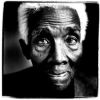C. L. R. James

C. L. R. James
Cyril Lionel Robert James, who sometimes wrote under the pen-name J. R. Johnson, was an Afro-Trinidadian historian, journalist and socialist. His works are influential in various theoretical, social, and historiographical contexts. His work is a staple of subaltern studies, and he figures as a pioneering and influential voice in postcolonial literature. A tireless political activist, James's writing on the Communist International stirred debate in Trotskyist circles, and his history of the Haitian Revolution, The Black Jacobins, is a seminal text...
NationalityTrinidadian
ProfessionJournalist
Date of Birth4 January 1901
The international proletariat first appeared on the scene in the early Thirties of the nineteenth century, and its first great action was the French Revolution of 1848.
First of all, Bolshevism represents...
Dissimulation is the refuge of the slave.
The most striking development of the great depression of 1929 is a profound skepticism of the future of contemporary society among large sections of the American people.
I had a national and international reputation. I had written the history and articles. So I brought to the Trotskyist movement some international reputation.
It is over one hundred years since the abolition of slavery. The Negro people in the United States have taken plenty and they have reached a stage where they have decided that they are not going to take any more.
All peoples are entangled in the net of the world market.
Today, in American imperialism, the commodity has reached its most grandiose historical manifestation.
The home stands in contrast to all other capitalist institutions as the last stronghold of pre-capitalist isolation.
It is in revolutionary periods that the culmination of previous trends and the beginning of new ones appear.
Property-owners are the most energetic flag-waggers and patriots in every country, but only so long as they enjoy their possessions: to safeguard those they desert God, King and Country in a twinkling.
Why are you chasing your tail so?" Said the kitten, "I have learned that the best thing for a cat is happiness, and that happiness is my tail. Therefore, I am chasing it: and when I catch it. I shall have happiness." Said the cat, "My son, I, too, have paid attention to the problems of the universe. I, too, have judged that happiness is in my tail. But, I have noticed that whenever I chase it, it keeps running away from me, and when I go about my business, it just seems to come after me wherever I go.
When history is written as it ought to be written, it is the moderation and long patience of the masses at which men will wonder, not their ferocity.
It is Toussaint's supreme merit that while he saw European civilisation as a valuable and necessary thing, and strove to lay its foundations among his people, he never had the illusion that it conferred any moral superiority. He knew French, British, and Spanish imperialists for the insatiable gangsters that they were, that there is no oath too sacred for them to break, no crime, deception, treachery, cruelty, destruction of human life and property which they would not commit against those who could not defend themselves.